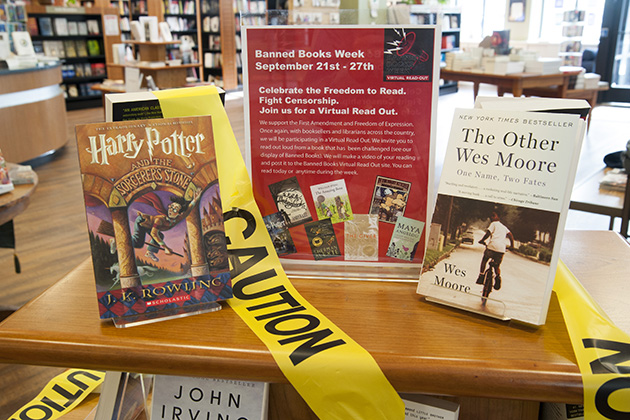Concerned citizens across the nation are marking the American Library Association’s annual Banned Books Week, Sept. 21-27. Suzy Staubach, manager of general books at the UConn Co-op bookstore, notes that the age-old, world-wide issue of censorship is taking on new forms in the current economic and cultural context.
In recent weeks, examples of censorship have cropped up around the globe. Russia’s Parliament moved to gain control of the media by taking steps to require non state-owned publications, such as the nation’s edition of “Forbes” to become Russian owned and thus less critical of the government. The Chinese government sentenced a prominent scholar to life in prison to silence him and prevent him from posting essays about the status of the Uyghurs on his website. It is a time-tested tactic. Throughout the millennia, governments have exercised censorship as a way to control the populace and maintain power.
But today, in the 21st century, we are encountering a form of censorship as a tool of economic power. Even in the U.S., where the First Amendment protects our freedom of expression and freedom of information, censorship is an issue. Since last spring Amazon, considered by many a monopsony, has stopped selling books by the publishing company Hachette over a dispute over the price of e-books, a tactic it used against Macmillan Publishers a couple of years ago. Now many Hachette writers are angry and pressuring Amazon by taking their anger to the reading public, which could threaten the company’s own economic power.
And the economic tactic does not always work. When Alison Bechdel’s award-winning graphic novel “Fun Home” was included on the summer reading list for incoming freshmen at the College of Charleston, the South Carolina House of Representatives voted to cut funding for the school. Fortunately, the college did not remove the book, despite congressional pressure. “It’s sad and absurd that the College of Charleston is facing a funding cut for teaching my book — a book which is after all about the toll that this sort of small-mindedness takes on people’s lives,” Bechdel told “Publisher’s Weekly.”
Other books challenged this year include “Brave New World” by Aldous Huxley, “Of Mice and Men” by John Steinbeck and “Native Son” by Richard Wright, which the school board in Baxley, Ga., removed from its school system after a church minister objected to it. The Blue Valley School District in Kansas has petitioned for 13 books to be removed from their schools including “One Flew Over the Cuckoo’s Nest” by Ken Kesey, and “Animal Dreams” and “The Bean Trees,” both by Barbara Kingsolver.
For the past two years, the children’s series “Captain Underpants” by Dav Pilkey has topped the Office for Intellectual Freedom’s list of the 10 most challenged books. Pilkey, who has been a guest of the UConn Co-op, has made a YouTube video in response.
In addition to having a display of challenged books, the UConn Co-op bookstore at Storrs Center is again participating in the nationwide “Virtual Read Out,” sponsored by the American Booksellers Association, American Library Association, American Society of Journalists and Authors, American Booksellers Foundation for Freedom of Expression, and the National Coalition Against Censorship, among others.
Students and faculty are invited to stop by the bookstore and read a minute or two from a book that has been challenged. A video of the reading will be included on the “Virtual Read Out” Channel on YouTube. Last year, President Susan Herbst read from “Persepolis,” which was challenged in Chicago.
Books are usually challenged by well-intentioned people who find the titles and content offensive or harmful. However, citizens are equally able to choose what to write or read. And, where to spend their money.




